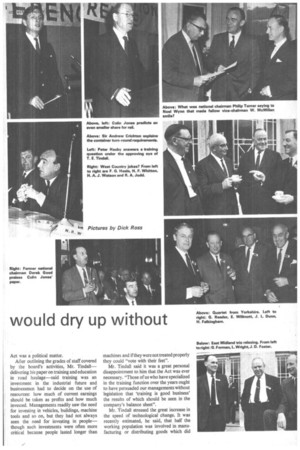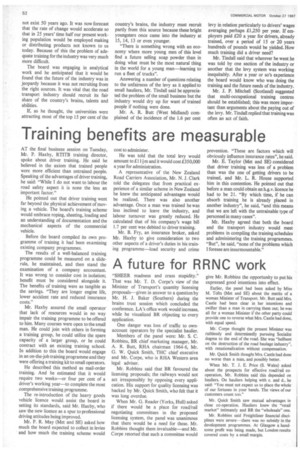would dry up without
Page 53

Page 54

If you've noticed an error in this article please click here to report it so we can fix it.
Act was a political matter.
After outlining the grades of staff covered by the board's activities, Mr. Tindall— delivering his paper on training and education in road haulage—said training was an investment in the industrial future and businessmen had to decide on the use of resources: how much of current earnings should be taken as profits and how much invested. Managements readily saw the need for investing in vehicles, buildings, machine tools and so on, but they had not always seen the need for investing in people— though such investments were often more critical because people lasted longer than machines and if they were not treated properly they could "vote with their feet".
Mr. Tindall said it was a great personal disappointment to him that the Act was ever necessary. "Those of us who have specialized in the training function over the years ought to have persuaded our managements without legislation that 'training is good business' the results of which should be seen in the company's balance sheet".
Mr. Tindall stressed the great increase in the speed of technological change. It was recently estimated, he said, that half the working population was involved in manufacturing or distributing goods which did not exist 50 years ago. It was now forecast that the rate of change would accelerate so that in 25 years' time half our present working population would be employed making or distributing products not known to us today. Because of this the problem of adequate training for the industry was very much more difficult.
The board was engaging in analytical work and he anticipated that it would be found that the future of the industry was in jeopardy because it was not recruiting from the right sources. It was vital that the road transport industry should recruit its fair share of the country's brains, talents and abilities.
If, as he thought, the universities were attracting most of the top 15 per cent of the country's brains, the industry must recruit partly from this source because these bright youngsters once came into the industry at 15, 14, 13 or even younger.
"There is something wrong with an economy where more young men of this level find a future selling soap powder than in doing what must be the most natural thing in the world for a young man—learning to• run a fleet of trucks".
Answering a number of questions relating to the unfairness of the levy as it applied to small hauliers, Mr. Tindall said he appreciated the problem of the small business but the industry would dry up for want of trained people if nothing were done.
Mr. A. R. Butt (West Midland) complained of the incidence of the 1.6 per cent levy in relation particularly to drivers' wages averaging perhaps £1,250 per year. If employers paid £20 a year for drivers, already trained, over a period of 15 or 20 years hundreds of pounds would be yielded. How much training did a driver need?
Mr. Tindall said that wherever he went he was told by one section of the industry or another that the levy system was working inequitably. After a year or so's experience the board would know who was doing the training and the future needs of the industry.
Mr. J. P. Mitchell (Scotland) suggested that multi-occupational training centres should be established; this was more important than arguments about the paying out of the levy. Mr. Tindall replied that training was often an act of faith.






















































































































